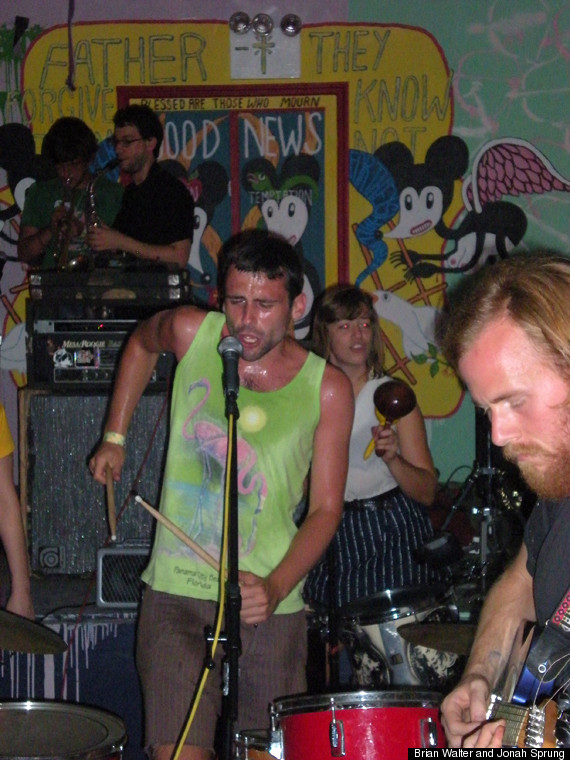

On Monday night, fresh off a hard weekend spent stereotyping ourselves on the Jersey Shore, we headed back into Brooklyn to see the Athens favorite Quiet Hooves along with an assortment of other acts. The transition was a painful one, and our spirits were flagging as we walked from the subway to our destination venue, Death By Audio. Entering the dingy basement by the industrial Williamsburg waterfront did little to lift them; there were about five people inside, two of whom were likely candidates for parents of the band, and the show space was so small that we had to hide behind a stack of amplifiers to avoid making awkward eye contact with the performers. We had been worried about arriving half an hour late, but were clearly at least an hour too early.
Shingles were the first band to play, and gave us hope for the night to come. They fought valiantly to raise the energy of the anemic crowd, playing their noisy yet pleasing garage-rock with an impressive amount of gusto. Frontman Sonny Roach moved like a pull string doll who's only two actions were 'shuffle in place' and 'spin in tight circles'. It was great.
After a quick coffee break, we returned just in time to be assaulted by the crowd-prowling lead singer Billy Brat of Buck Gooter, a noise-rock duo from Virginia who accurately describe themselves as "selectively beloved." We made our way back to our previous hiding spot behind the amp, thinking it was beyond the reach of his microphone cord (we were wrong). Although their guitar player was legally blind, he had no trouble flying around the fretboard, and Billy had no trouble pinpointing uncomfortable (read: everyone) members of the audience and screaming directly into their shoulders. As the set ended and he stepped off stage, we realized he was not under the influence of anything, which made him even more terrifying.
By this time a small crowd had formed, which was fortunate because as the ten members of Quiet Hooves took the stage it became apparent that they had accounted for at least 75% of the previous audience. When they began to play the crowd didn't quite know how to react to their particular brand of whimsical pop. Quiet Hooves come from the rich Athens, GA tradition of strange yet innovative pop music. Their large ensemble, which included a three piece horn section, three keyboards, a guitar, a bass and the happiest auxiliary percussion player we've ever seen, created a gloriously chaotic sound that threatened to collapse but never did. This was mostly intentional but also was partially due to the fact that many key band members were not present, including a bass player away at a surprise wedding in Cancun.
Opener "hott r nott" was well played and would have probably got the crowd going, but the sound wasn't mixed quite right for the first four or so songs, which dulled their impact. The 'sound guy' got it right in time for "Your Troubles", finally making the catchy horn hooks audible, which won them the first real applause of the night. From that point on the band was off to the races, Mercer West leading the way with his unconventional drumming (he played his kit standing up) and spastic dancing. Julian Bozeman, the main songwriter/composer, anchored the band on keys and vocals, singing with enough enthusiasm that you could never tell which direction his voice was about to crack in.
By the end of their tragically short set, most of the audience was doing something that closely resembled dancing -- no small feat considering how stiff the crowd had been for most of the night. After the show, members of the band took advantage of the discount beer ($1) they were provided and mingled with the audience. Mercer West manned the merchandise table, which was probably a poor business decision -- even though the records were priced at $5 to $10, he forced them into the hands of anyone who paused at the table for more than a moment. When they tried to bashfully refuse the free albums, he reminded them that it had cost $7 dollars to get in to the Death By Audio, a price that seemed to offend him.
"I've never paid for a show in my life," he said with a mischievous grin.